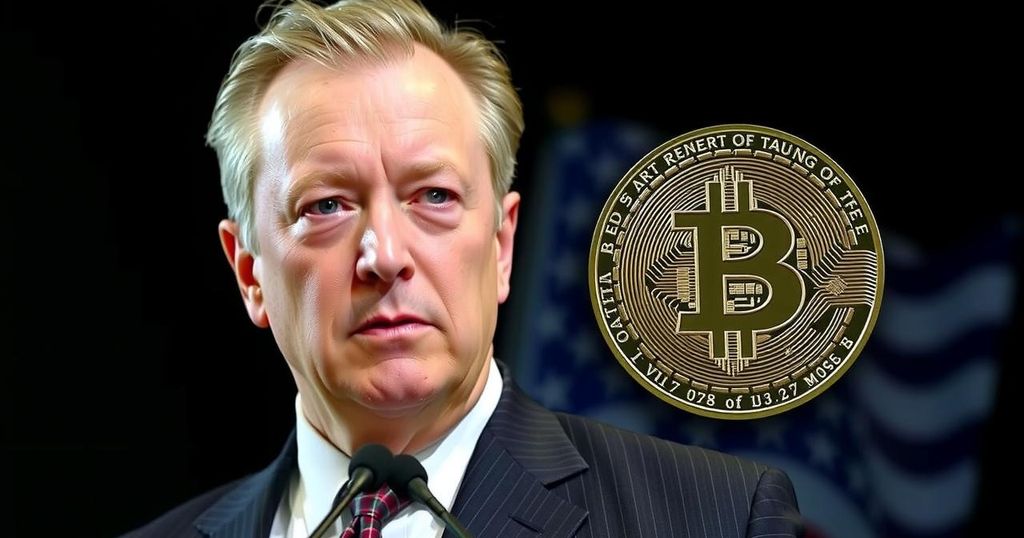Elon Musk Sounds Alarm on U.S. Spending Amid Bitcoin Turmoil and National Debt Crisis
Elon Musk has recently voiced grave concerns regarding U.S. government spending, warning that it could lead to national bankruptcy. His remarks follow Tesla’s movement of substantial Bitcoin assets, which has sparked panic in the cryptocurrency market amid rising national debt. Analysts anticipate that ongoing fiscal irresponsibility could further inflate debt levels, thereby influencing Bitcoin’s market dynamics and investor behavior.
Elon Musk, the billionaire CEO of Tesla, recently ignited panic in the cryptocurrency market following the movement of a substantial amount of Bitcoin previously held by Tesla. This shift involved approximately $750 million worth of Bitcoin that had remained dormant for two years, leading to speculation that Tesla may have divested its remaining assets in this cryptocurrency. This movement follows a notable increase in Bitcoin prices which had approached an all-time high of nearly $70,000, attributed primarily to influences such as BlackRock and the Chinese market. Moreover, Musk has reiterated warnings about concerning U.S. government spending levels, suggesting that such fiscal irresponsibility could lead the nation towards bankruptcy. He highlighted an alarming increase in national debt, indicating that $500 billion was added within a mere three weeks, and criticized excessive government expenditure as a detrimental practice. Musk remarked on social media platform X, “Excess government spending is driving America to bankruptcy.” During a town hall discussion, Musk elaborated further on the implications of this spending, positing that it could result in runaway inflation, deeming the situation “pernicious” for the country’s economy. He emphasized the importance of reducing government spending to prevent escalating national debt from becoming unmanageable. In a subsequent post, Musk called for an end to wasteful financial practices, stating, “this needs to stop,” while advocating for the creation of a Department of Government Efficiency, a concept he is reportedly willing to lead. The U.S. national debt has continued to reach unprecedented levels, surpassing $34 trillion earlier in 2024, primarily due to economic responses to the COVID-19 pandemic. Analysts predict that the national debt could escalate to $36 trillion by the end of the following year, owing to ongoing fiscal initiatives. This trend has been linked to potential surges in Bitcoin prices as investors flee traditional fiat currencies, favoring stable assets like gold and cryptocurrency amidst fears of inflation and financial instability as indicated by JPMorgan analysts. Elon Musk’s recent engagements and discussions about Bitcoin, alongside his stark warnings concerning the fiscal direction of the United States, have underscored the intricate relationship between government spending and the performance of cryptocurrencies. Furthermore, his advocacy for a more structured approach to governmental expenditure reflects a broader apprehension within the economic landscape regarding sustainable financial policies.
The article discusses recent developments surrounding Elon Musk and his commentary on U.S. government spending, particularly in light of Bitcoin price fluctuations. It addresses the implications of Tesla’s actions regarding Bitcoin and Musk’s warnings about fiscal irresponsibility by the U.S. government, suggesting that unsustainable expenditures could lead to severe economic consequences, including potential bankruptcy. The relevance of national debt and its relation to cryptocurrency investment strategies also forms a backdrop to Musk’s statements, revealing how current economic policies are observed and critiqued by prominent business figures.
In conclusion, Elon Musk’s assertions regarding U.S. governmental spending and its potential to lead to bankruptcy reflect significant financial concerns that accompany current economic practices. The movement of Bitcoin assets by Tesla, coupled with rising national debt, highlights the interconnectedness of cryptocurrency markets and government fiscal strategies. As economic instability looms, investors may increasingly turn to alternative assets like Bitcoin as a hedge against inflation and diminishing confidence in fiat currencies, especially in an election year characterized by heightened uncertainty and market volatility.
Original Source: www.forbes.com








Post Comment